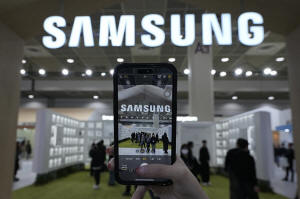|
The
South Korean technology giant said its operating profit for the
July-September period increased by more than 277% from a year
earlier to 9.18 trillion won ($6.65 billion). But the figure
represented a 12% decline from the second quarter, which Samsung
attributed largely to one-off costs, such as provision of
employee incentives in its computer chip business, and the
effects of a weaker U.S. dollar.
Samsung’s semiconductor division earned 3.86 trillion won ($2.8
billion) in operating profit during the quarter, rebounding from
a deficit during 2023 but sharply declining from the 6.45
trillion won ($4.67 billion) it reported in the April-June
period.
While Samsung saw solid demand for AI and server chips during
the past quarter, its mobile chip business weakened as some
customers adjusted inventories. The market was also affected by
Chinese manufacturers’ increased supply of legacy memory
products, the company said in a statement.
More critically, Samsung lagged behind key competitors such as
SK Hynix in HBM3E, the latest generation of high bandwidth
memory chips that are used to power AI applications.
During a conference call, Samsung Executive Vice President
Jaejune Kim said the company recently made a “meaningful
advance” in a qualification test process to provide its HBM3E
products to an unspecified “major client,” a development he said
could possibly drive up sales during the fourth quarter. Kim’s
comments touched off speculation that Samsung was closing in on
a supply deal with Nvidia, a major U.S. maker that designs
advanced chips powering AI.
“In the fourth quarter, while memory demand for mobile and PC
may encounter softness, growth in AI will keep demand at robust
levels. Against this backdrop, the company will concentrate on
driving sales of high-bandwidth memory and high-density
products,” Samsung said.
All contents © copyright 2024 Associated Press. All rights reserved

|
|




